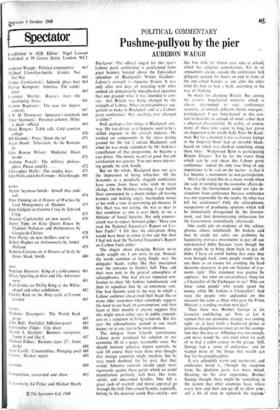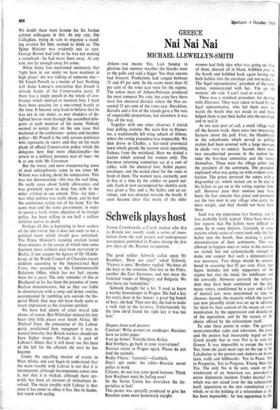Pushme-pullyou by the pier
POLITICAL COMMENTARY
AUBERON WAUGH
Blackpool—The official slogan for this year's Labour party conference is proclaimed from great banners hoisted above the Edwardian splendour of Blackpool's Winter Gardens: Labour's strength is changing Britain. It was only after two days of wrestling with what seemed an unnecessarily metaphysical equation that one grasped what it was intended to con- vey: that Britain was being changed by the strength of Labour. What an extraordinary sug- gestion to make in Blackpool. and at a Labour party conference! Has anything ever changed at either?
Well, perhaps a few things in Blackpool. any- way. My taxi driver, as it happens, used to be a skilled engineer in the aircraft industry. He worked on components in the stress testing ground for the TSR 2 outside 'Blackpool. and when he was made redundant by Mr Jenkins's cancellation of that programme, he became a taxi driver. The money wasn't so good, but job satisfaction was greater. You met more interest- ing people, he said, kindly.
But on the whole, Blackpool does not give the impression of being white-hot. All the dynamics at a peculiarly sluggish conference have come from those who wish to resist change. On the Monday morning, I saw Judith Hart surrounded by a dozen miners all waving banners and making angry. inarticulate noises at her with a view to preventing pit closures. If Mrs Hart was not crying, she was as near to that condition as one is ever likely to sec a Minister of Social Security. Her only counter- attack was to repeat. between gulps: 'Have you read the National Executive's Report on Car- bon Fuels?' I felt that the chivalrous thing would have been to come to her aid, but then I had not read the National Executive's Report on Carbon Fuels either.
The slogan about changing Britain never really caught on, I am sorry to say. Instead, the words continue to hang limply over the delegates' heads, rather like that inscription over the entrance to Dante's hell. They add their own note to the general atmosphere of schizophrenia. One had always expected con- ference to cheer Mr Jenkins tumultuously and then to repudiate him by an enormous vote. One had become used to the way in which a Labour audience always nod their heads like so many elder statesmen when somebody suggests the need to cut back on consumption, and then foam at their mouths if anyone suggests that this might mean either cuts in public expendi- ture or a reduction in living standards. But this year the schizophrenia seemed to run much deeper, or at any rate to be more obvious.
The delegate from Lincoln constituency Labour party produced his solution to our economic ills in a quiet, reasonable voice. We should institute selective import controls, he said. Of course there were those who thought that foreign countries might retaliate, but he very much doubted, for his part, that they would. Selective controls should apply most rigorously against those goods which we could manufacture perfectly well here, like wine, spirits, and one-armed bandits. One felt a great rush of warmth and moral approval go through the hall. One-armed bandits, especially, belong to the despised candy floss society—not like free milk for fifteen year olds at school; which has religious connotations. Yet in art amusement arcade outside the conference hall delegates queued for hours on end in front of the one-armed bandits as one after the other tried his luck or had a bash, according to his way of thinking.
So much for changing Britain. But among the earnest, long-haired minority which is always determined to take conferences seriously, an entirely different theme emerged :1 participation. I use 'long-haired' in this con- text to describe an attitude of mind, rather than a physical characteristic. In reality, of course, many of those who aspire to long hair prove on inspection to be totally bald. Poor Mr Kauf- man. But for a moment it was as if every lounge in the Imperial Hotel had an invisible black- • board on which was chalked something along these lines: 'Wedgwood Senn is participating Britain. Discuss.' Yet by far the truest thing which can be said about this Labour party conference--indeed the only true thing of any importance to be said on the matter--is that it has become a monument to non-participation.
Mrs Castle stated this in as many words when she said, in winding up the economic affairs de- bate, that the Government could not take in- structions from conference because conference was not responsible for the results. So what was left for conference? Only the schizophrenic occupations of producing opinions which will be immediately disregarded by the Govern- ment, and then demonstrating enthusiasm for the Government immediately afterwards.
One could pile on evidence of this schizo- phrenia almost indefinitely. Mr Jenkins said that he could not solve our problems by liquidating overseas investments to pay off our international debts because 'even though the plan might be to bring them back to pay off debts, I have an awful feeling that once they were brought back, some people would try to use them as an excuse for avoiding the hard decisions necessary to put our balance of pay- ments right.' This statement was greeted by applause : but what an extraordinary thing for a Chancellor of the Exchequer to say! Who are these 'some people' who would spend the money while Mr Jenkins is Chancellor? And were the people who applauded on this occasion the same as those who gave the Prime Minister a standing ovation next day?
Then there was Brother George at his favourite soul-baring act. Now at last it seemed that our economic strategy was coming right—or at least (with a backward glance at previous deceptions) we must act on the assump- tion that this was so. Affluence was not enough, and never would be—not even when we each of us had a cabin cruiser in the garage. Still, George had a 'sense of unfairness,' and he wanted more of 'the things that wealth can buy' for his granddaughter.
It was splendidly warm and incoherent, and conference loved it, I ?lthough the reception from the platform party was more mixed. Drawing on his own experience, Brother • George thought there might be 'something in the system that other countries have, where every now and then you go off to allow your- self a bit of time to replenish the engines.' No doubt there were lessons for his former cabinet colleagues in this. At any rate, Jim Callaghan, trying in vain to organise a stand- ing ovation for him, seemed to think so. The P4ihne Minister was evidently not so sure. George Brown had told us he was not making a comeback—he had never been away. At any rate, not far enough away for some.
When Jenny Lee mentioned ominously that 'right here in our midst we have madmen in high places' she was talking of someone else— Mr Enoch Powell, as a matter of fact. Nothing will shake Labour's conviction that Enoch is already leader of the Conservative party. If there was a single speech in the whole of con- ference which omitted to mention him, I must have been queuing for a one-armed bandit at the time. It became very hard to believe that he . was not in our midst, as new shudders of de- lighted horror went through the assembled dele- gates at each mention of his name. Nobody seemed to notice that on the one issue that mattered at the conference—prices and incomes policy—Mr Powell is the only serious politician who represents its views, and that on the main plank of official Conservative policy which the delegates here find most objectionable—the return to a military presence east of Suez—he is at one with Mr Crossman.
But the worst, and most overpowering sense of mad schizophrenia came to me when Mr Wilson was talking, about his compassion. This was not showmanship—this was the real thing. He really cares about family allowances, and was genuinely upset to deny free milk to the -older :nildren in our schools. This—for him— was what politics was really about, and he had the conference eating out of his hand. Yet the same man and the same government, in order to secure a fairly minor objective of its foreign policy, has been willing to see half a million children starve to death.
Perhaps all this is beginning to bore readers of the SPECTATOR, but it does not seem to me a
political event which should pass unnoticed.
The Prime Minister's standing ovation lasted three minutes, in the course of which time some fourteen more children died from starvation in Biafra, if one accepts the figures of Dr Middle- koop, of the World Council of Churches (seven children according to the International Red .Cross, two according to the Commonwealth Relations Office, which has not had anyone there for a year). The only reminder of this at Blackpool so far has been the presence of some • Biafran demonstrators, but as they are liable to demonstrate with a song and dance routine, accompanied by tumbling acts outside the Im- perial Hotel, they may not have made quite as much impression as the situation justified.
We have had plenty of other moral side shows, of course. Ben Whittaker minced his tiny heart into little pieces over South Africa. Mr Michael Foot, the conscience of the Labour party, proclaimed how repugnant it was to natural morality that British workers should not have higher wages. Perhaps it is part of Labour's illness that it will never see this hero of the left for the affected old man he has become.
Under the appalling shadow of events in West Africa, one can begin to understand that the main trouble with Labour is not that it is incompetent, although incompetence comes into it, nor that it is wicked, although there cer- tainly has been an element of wickedness in- volved. The main trouble with Labour is that since it has come to office it has, like its leader, lost touch with reality.







































 Previous page
Previous page